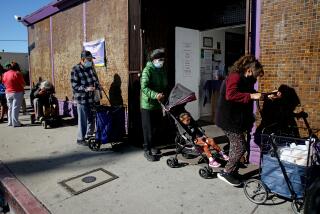South-Central Debate: Is Good Housing Critical . . . : Development: It’s not a case of commercial vs. residential. Both types of projects can serve and enrich the community.
- Share via
Healthy neighborhoods require key elements: jobs and incomes sufficient to raise families; access to jobs (both in and outside the neighborhood); stores and banks; schools and parks; health-care facilities and safe, decent affordable housing.
No city--certainly not Los Angeles--can prosper without an adequate supply of affordable housing. Businesses will not come, stay and grow if they cannot house their work forces, no matter how many police patrol the streets. Retail will suffer if many households continue to pay more than half their incomes for rent.
Even with the slump in prices and rents, Los Angeles still has the widest gap between wages and housing prices of any major city. Most of the region’s rental vacancies are for higher-priced one- and two-bedroom units, while the need is for moderately priced three- and four-bedroom units. There are long waiting lists for the city’s small stock of subsidized units. Each year, the city loses almost 14,000 units of affordable housing to deteriorating stock and demolition, while producing fewer than 5,000 units. Before the earthquake, Los Angeles had the dubious distinction of having the worst affordable housing crisis in the country. The earthquake demolished more than 25,000 units, 93% of them multifamily and largely affordable. Los Angeles now has the worst affordable housing crisis with the largest pile of rubble.
It is incredible that in this situation there are those who would argue against affordable housing. Opponents to housing cite high vacancy rates--rates that stem from renters’ lack of income, not overproduction of stock. In times of tight budgets, we have debates about whether housing is less important than education, less important than police or transportation--indeed, even whether housing is less important than investment in economic development.
The debate over a portion of Vermont Avenue at 81st Street--whether to include housing in a mixed-use development or have the entire portion dedicated to economic development--is not about whether to revitalize a neighborhood, but how. This debate will be decided in the community, but the argument that the affordable housing being proposed is “the easy way out” is not in the best interest of the community, nor is it factual.
Housing has, tentatively, been put on the public agenda as a result of advocacy by community-development organizations and residents. Banks are now required to invest in low-income communities because of their Community Reinvestment Act responsibilities, and they invest in housing because advocates have demanded they do so. A city Housing Department was created because advocates demanded attention to the issue.
Many of the organizations that carried out this advocacy are nonprofit development corporations. They do housing and they do economic development. They do not do one because it is easy; they do both because it is necessary.
Los Angeles has the potential to both build more affordable housing and create more economic development (and we must not forget that housing production is economic development). A strong “community development” agenda for the city would include initiatives such as:
* Forming a “community partnership” to bring businesses, government and nonprofits together to undertake both housing and economic development.
* Establishing a housing trust fund supported by a linkage fee on commercial development.
* Encouraging the city’s major lenders to form more bank-sponsored community-development corporations, such as the one now under way in South-Central.
* Working with banks to build branches in inner-city neighborhoods. Experience in other cities, such as Boston, demonstrates that branches in low-income areas can be profitable.
* Implementing a “linked deposits” policy. Like Pittsburgh, Chicago and Boston, Los Angeles should research and publish an annual banking “report card,” including mortgage lending, branch sites and employment. The city’s own deposits should be in banks with a track record of meeting neighborhood needs.
* Providing support to grass-roots credit unions that focus on promoting neighborhood businesses.
* Creating elected neighborhood councils with real decision-making power regarding community development.
We lost thousands of jobs in the April, 1992, unrest. We lost thousands of housing units in the earthquake. Our communities continue to deteriorate. We need to build affordable housing--for shelter and as an economic development tool. We need to invest in economic development and create more jobs. And we need to do it now.
More to Read
Sign up for Essential California
The most important California stories and recommendations in your inbox every morning.
You may occasionally receive promotional content from the Los Angeles Times.






